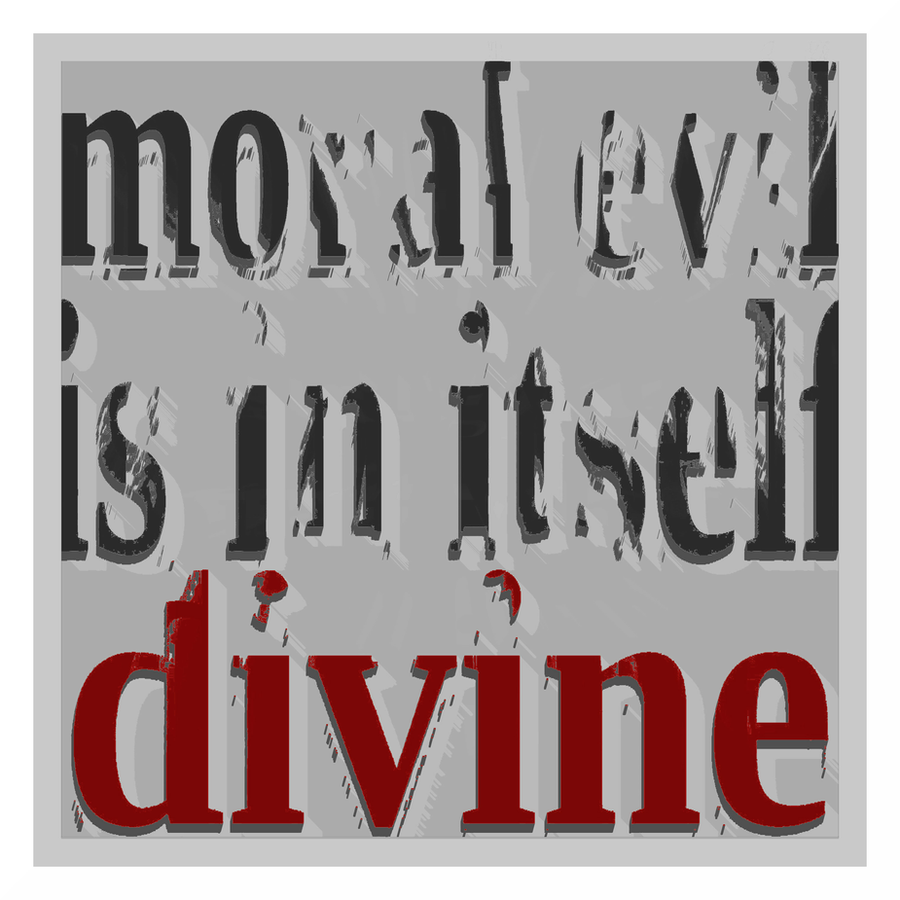HOME | DD
 undefinedreference — More Divine Evil
undefinedreference — More Divine Evil

Published: 2022-04-04 15:10:27 +0000 UTC; Views: 612; Favourites: 0; Downloads: 0
Redirect to original
Description
(probably not my greatest work of 'art' ever, but at least the story should be well worth reading)A distinction must be made at all time between mystics and Gnostics. The latter believe that the material world is a cosmic mishap, an evil prison in which the souls of the chosen ones (themselves) are imprisoned. Mystics operate withing the bounds of the good God / good Universe message propagated by monotheistic beliefs, religious 'truths' which are expected to be left unquestioned, well, at a ceremonial level at least. In reality they are constantly testing those very bounds, habitually questioning every last axiom of faith. Is 'God' really nothing put pure good? And if so, where does Evil fit in? And so on.
One thing that marks Gnostics and Russian ideologists alike is appropriation. In their eclecticism they are capable of absorbing every existing idea as their own and every philosopher and mystic as a kindred spirit. For example, New Agers, who can safely be labeled Gnostics for practical purposes, adore medieval Christian mystic Hildegard von Bingen as one of their forerunners, conveniently ignoring the fact that back then she would have wholeheartedly supported their persecution. The actual forerunners of modern Gnostics, the Cathars, appropriated the entire Christian Scripture in a similar manner, reinterpreting, and at times rewriting the thing to suit their own convictions.
At a rational level, Gnostics are complete and utter frauds, distorting and making up facts as they go along, which incidentally doesn't mean anything to them at all, since 'fact' is an attribute of the material world, and the material world is evil. Observable facts therefore have little meaning to these people. This is indeed largely where the modern 'facts are just opinions' approach stems from.
I should make a case for these Gnostics though. Being a combination of 'spiritual' airheads and in the best case utterly principled (as well as disciplined, like the mystics) persons, they are neither capable nor willing to organize and arm themselves in a remotely effective way, which almost invariably leaves them at the receiving end of persecution and organized homicide. In that sense they have a far better track record than their historic arch enemies, the so-called Christians. A lot less blood on their hands. A possible exception would be Nazi Germany, which according to some was a case of Gnosticism transformed into a State. In general, though, it seems far better to approach them with a sense of humor and some ridicule (as religious fundamentalists in their own right, they do tend to take themselves extremely seriously), rather than hostility.
There are also the Pantheists, who believe the Universe is a living, conscious Being, and, like the Gnostics, that the human 'soul' (again, at least that of the chosen) is of a divine nature. At a practical level these are definitely the most hilarious ones, since some of the most creative rogues in history were Pantheists. Members of a medieval pantheist sect, the Brethren of the Free Spirit, were reputed to seduce innocent maidens with the promise that by sleeping with them, they would be able to share in their divinity. And whichever moral 'crimes' the English Ranters may be accused of having committed, taking themselves too seriously doesn't seem to appear amongst them.
Of all these, the mystics are still the most interesting ones. Balancing on the very edge of what is both theologically acceptable and theoretically possible, their minds are in a feedback loop in which the distinction between black and white, up and down, good and evil blurs. Their domain is that of the Greek philosophers, who believed in a state of perfect harmony in which opposites converge. They are lost (or: found!) in a 'divine' state of mind which 'contemplates contemplation', as the Greek philosopher-businessman Thales put it so poetically. They are playing with fire next to a theological, and, since religion is a part of human society, ultimately social and political powder keg. Cool!























